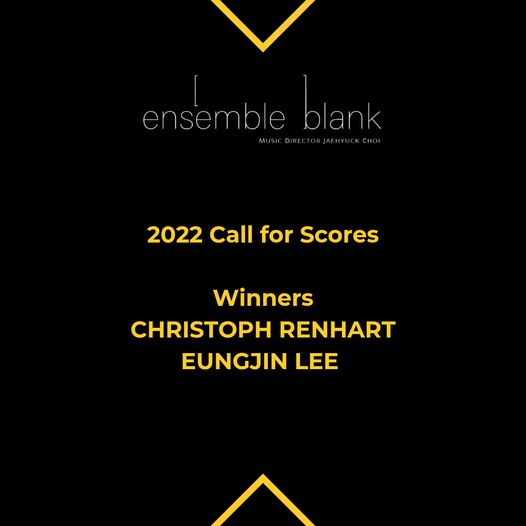
«Échos éloquents» to be staged in South Corea in 2023
I’m delighted to announce that my work Échos éloquents, composed for flute, clarinet, percussion, piano, violin, viola and violoncello has won an international call for scores launched by the renowned South Corean ensemble blank. The jury—consisting of the members of the ensemble—selected from nearly 150 submissions Eungjin Lee’s composition Geste I alongside my work. Both winning works will be played by the ensemble blank in the next season and will be recorded respectively. Moreover, the winners are awarded a cash prize, too.
Corea’s leading ensemble for contemporary music
ensemble blank was founded in 2015 by the composer and conductor Jaehyuck Choi, the pianist Da-hyun Chung, flutist Ji Weon Ryu and the percussionist Won Lee. In its concerts, the ensemble often combines classical masterworks and modern pieces. Vivaldi & Ligeti, Brahms & Furrer, or a wonderful programme entitled Definition of the Beauty where the audience was offered a subtle mixture of music by Messiaen, Pintscher, Furrer, Choi and Dalbavie contour quite an extraordinary curating—have a look at the ensemble’s concert history here, it’s absolutely remarkable.
In 2020 the young ensemble announced its first call for scores, this year being the third time such an opportunity was offered to composers under 35 years from all over the world.
About Échos éloquents
My successfully submitted piece was written in 2016 and premiered in the same year by the Schallfeld Ensemble in Graz. Back then I tried to compose a piece which has its climax far before its second half (one might typically try to avoid this as a composer). After having written a rather tradtional piano concerto before, I attempted to write a sort of concerto for a small ensemble with a cadenza somewhere in the middle and a rather long second half that functions a bit like a shadow of the first half (and thus being much longer). Of course the outcome deviates more or less from the original idea, however we can easily detect the two parts and the cadenza in (before) the middle when listening to this piece for the first time, I believe.
Being a concerto somehow, the music features many virtuous passages (not only with regard to the playing techniques but also harmonically). Besides it invokes many bell-like sounds (in many possible ways—I really love the sound of bells, plates, gongs and so forth) and also some melodic fragments that might be faintly reminiscent of a Chinese song.
To understand why I inwove such a pseudo-quotation we must have a look at the (already too) many versions of the piece. The version for 7 instruments was composed alongside a version where two Chinese instruments (pipa and erhu) were involved which was commissioned for a concert with the Klangforum in 2016 at the Konzerthaus in Vienna. Both versions are like Siamese twins (there are several differences nonetheless, thus the version with the Chinese instruments has got a different name, miroirs noirs, too). A few years later, in 2019, I have made a third version from the Échos for the Ensemble Musiques Nouvelles in the course of the ‘tactus Young Composers’ Forum. They have made a great video of this version in which I have added a trombone and a guitar to the seven original instruments in Mons. I’d really like to recommend this recording (see YouTube player below).